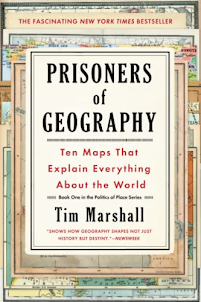Prisoners of Geography
by Tim Marshall
When I was studying linguistics in college, one of the points that was made and that stuck with me was how isolation can create a unique language - or a branch of it that doesn't evolve as much as varieties of it do that are spoken in more "open" geographic spaces.Nothing surprising about that - but it's one of those obvious insights you don't even consider until it's pointed out to you, and then you're either convinced you always knew it, or you are amazed it didn't occur to you long before.
There's a bit of each of those moments, page after page, in this uniquely fascinating book.
My one regret is that the maps themselves, at least in the paperback edition, are not as detailed as I might wish, and that, due to the constraints of the book's size, are cut off at inconvenient places - I see China, but I'd like to also see it set in the entirety of the Eastern Hemisphere, for example. Or show me Russia in relation to the Mediterranean Sea. But that's a small complaint, as the simple solution is keep an atlas nearby to consult when a question arises.
I have to admit to being, and always have been, a sucker for geography. I can happily pour over a map, simply fixing on place names, and what they tell me about the people who lived there and named these place were like - where they came from, what they did, the languages they spoke. Or marveling at how close - or far apart - two landmarks are.
Now that Google Earth allows me to actually see the topography of a region, I can again, happily consume half a day just "touring" a region from the comfort of my home. I have "walked" to my grade school in Buffalo again, and drifted down the Seine in France, and found hidden parks and forests for a Sunday exploration simply by picking a direction from home and looking around on a map.
Marshall's dive into geography is far more enlightened, and combines not just the mountains, rivers, deserts and forests of ten major region/nations of Earth, but he examines the history, the people, the nation-building and trade, and importantly, the political forces at play across these regions.
Included are: Russia, China, The United States, Western Europe, Africa, The Middle East, India and Pakistan, Korea and Japan, Latin America, and The Artic. The book was first published in 2015, and the version I own was published in a paperback edition in 2016, with some updates. What is truly instructive, I have found, is how prescient the author's observations are in terms of, particularly, the Russian/Ukraine conflict, the forces behind it and the regional needs and histories that make such a conflict appear inevitable.
His chapter on the United States describes not only in terms of is astounding resources and natural defenses, perfectly placed ports and built-in "highways" of water, but also explains its growth and development in terms of the times. He doesn't attempt to "blame" any of the regions he explores, or excuse them, for when, how or by whom they were populated and developed. Rather, his argument is largely that the places existed, with their mountains, rivers, fertile plains, jungles and deserts - these features shaped the people who inhabited them, limiting them or, alternately, giving them enormous advantages. They, the people, are indeed, "prisoners," both happy and frustrated, of their geography.
Geography can be a dry subject from the standpoint of the writing, but I give Marshall high marks for the ease of his prose - it almost reads with an enthusiasm for his subject that carries the reader along with him, and certainly makes it easy to follow the story he's laying out. I'd not hesitate to offer this book to a Junior High School class for enrichment, but it will be just as fascinating for a more sophisticated adult audience, both those who are already convinced geography is a fascinating subject, and those who (silly them!) never considered it of any use.
Given that he subtitles the book "Book One in the Politics of Place Series," I discovered that Marshall has also written "A Flag Worth Dying For: The Power and Politics of National Symbols," and "The Age of Walls: How Barriers Between Nations are Changing Our World," and finally "The Power of Geography: Ten Maps that Reveal the Future of Our World" (a sequel to "Prisoners of Geography"). And for the younger reader (or you, too) the illustrated "Prisoners of Geography, Illustrated Edition: Our World Explained in 12 Simple Maps."
Explore your world, with a great guide, from the comfort of your favorite reading spot.


Comments